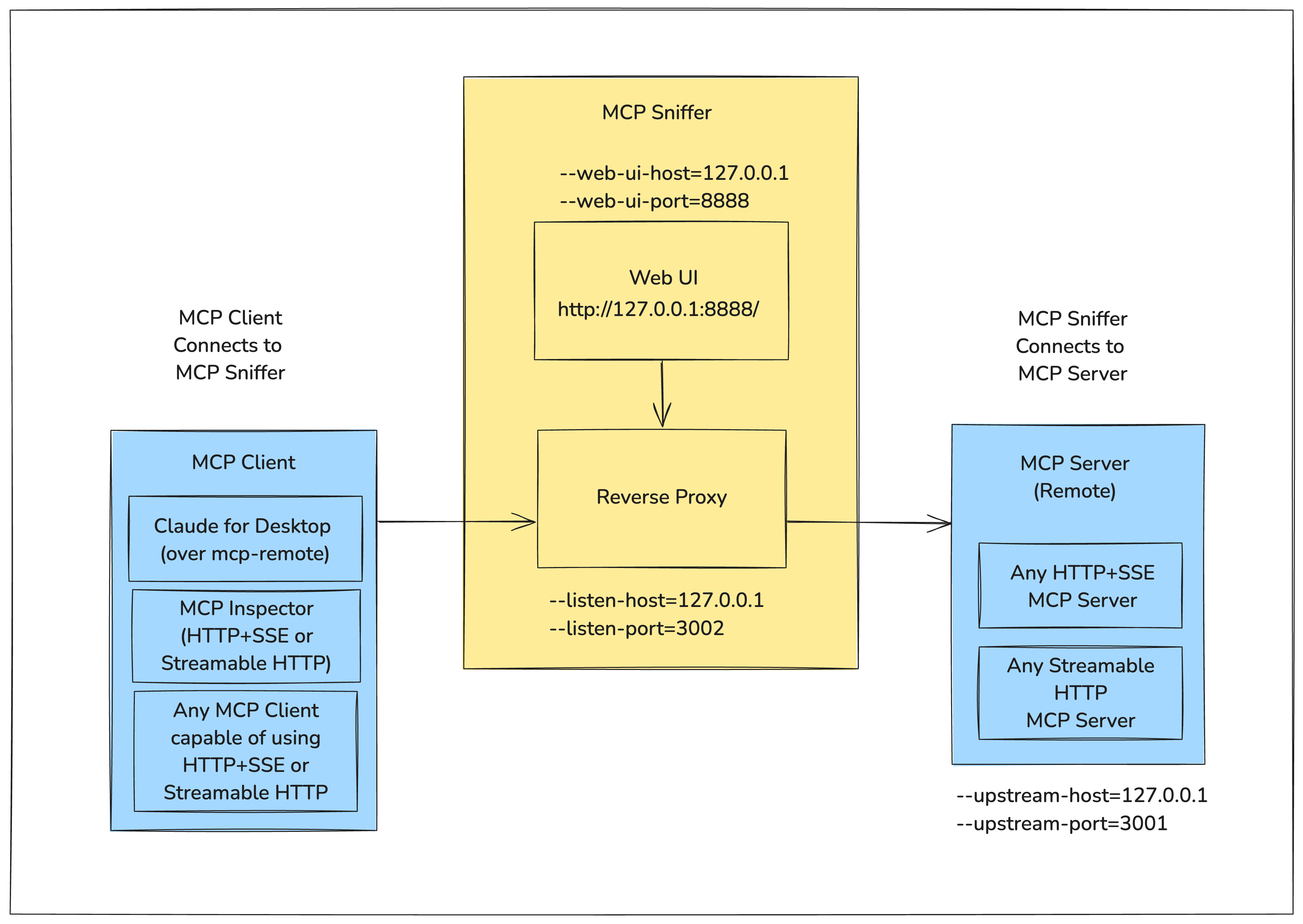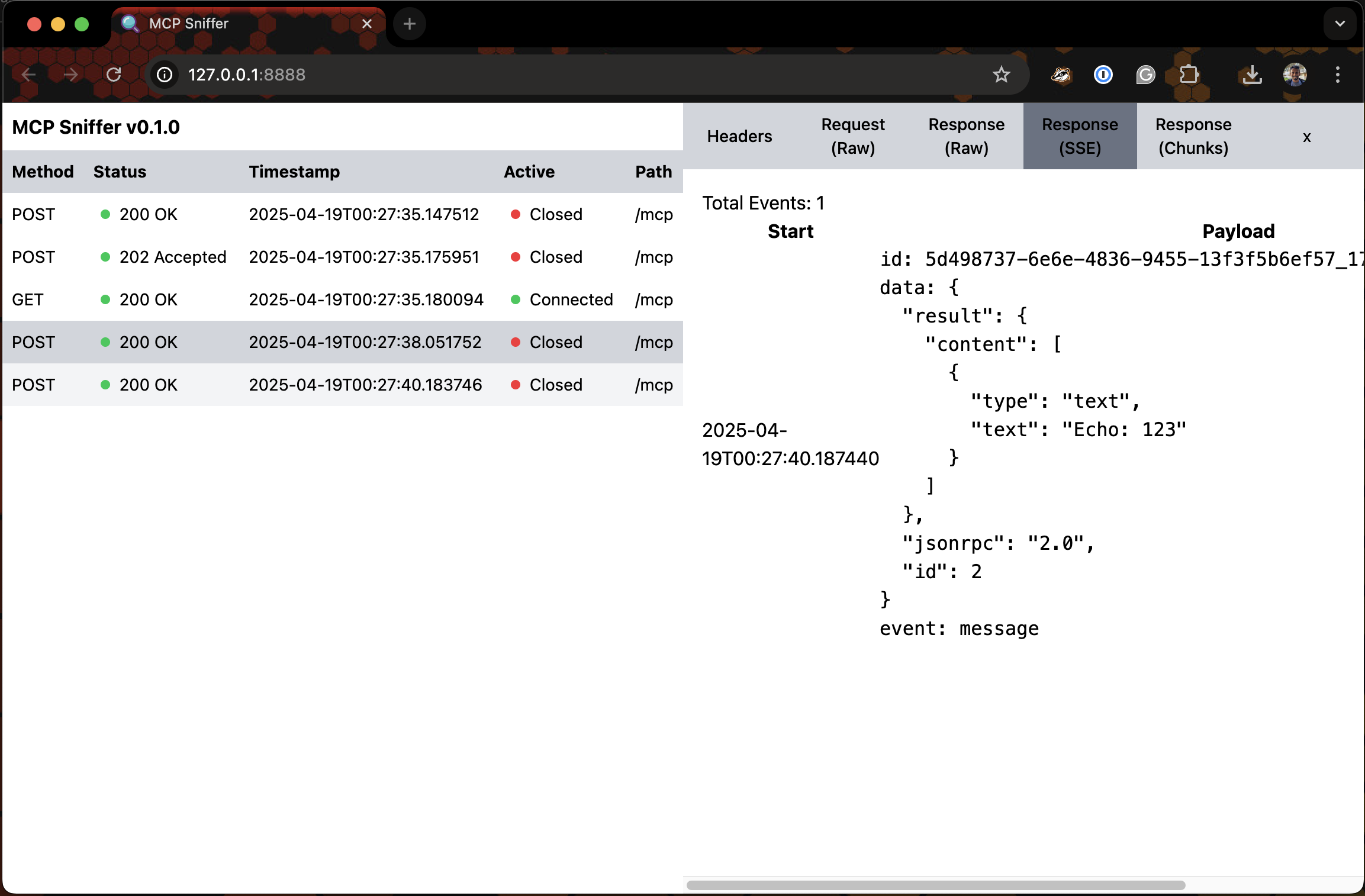MCP Sniffer
MCP Sniffer is a reverse proxy tool used to capture network traffic between MCP clients and servers, providing a Web UI to visualize request and response data.
rating : 2.5 points
downloads : 11
What is MCP Sniffer?
MCP Sniffer is a reverse proxy tool that sits between MCP clients and servers to capture and analyze network traffic. It provides a web interface similar to Chrome DevTools' Network tab for inspecting MCP communications.How to use MCP Sniffer?
Simply install the package and run it as a proxy between your MCP client and server. The web interface will automatically display all captured traffic for inspection.Use Cases
Ideal for debugging MCP implementations, analyzing protocol behavior, and understanding client - server interactions during development.Key Features
Traffic InspectionCaptures and displays all MCP requests and responses between client and server
Web InterfaceUser - friendly web UI for analyzing network traffic with filter and search capabilities
Easy SetupSimple installation and configuration process with sensible defaults
Pros and Cons
Advantages
Non - intrusive monitoring without modifying client or server code
Real - time traffic visualization
Helpful for debugging and development
Limitations
Adds slight latency as it proxies all traffic
Currently only supports MCP protocol
Web UI is in early development stage
Getting Started
Installation
Install using pipx for isolated Python environment
Configuration
Configure the listening port and upstream server details
Access Web UI
Open the web interface in your browser to view captured traffic
Usage Scenarios
Debugging Connection IssuesUse MCP Sniffer to identify where communication breaks down between client and server
Performance AnalysisMeasure request/response times to optimize your MCP implementation
Frequently Asked Questions
Does this affect my production traffic?
Can I use this with non - MCP protocols?
How do I contribute to the project?
Additional Resources
GitHub Repository
Source code and issue tracking
Model Context Protocol
Official MCP documentation
PyPI Package
Python package distribution
Featured MCP Services

Notion Api MCP
Certified
A Python-based MCP Server that provides advanced to-do list management and content organization functions through the Notion API, enabling seamless integration between AI models and Notion.
Python
141
4.5 points

Gitlab MCP Server
Certified
The GitLab MCP server is a project based on the Model Context Protocol that provides a comprehensive toolset for interacting with GitLab accounts, including code review, merge request management, CI/CD configuration, and other functions.
TypeScript
86
4.3 points

Markdownify MCP
Markdownify is a multi-functional file conversion service that supports converting multiple formats such as PDFs, images, audio, and web page content into Markdown format.
TypeScript
1.7K
5 points

Duckduckgo MCP Server
Certified
The DuckDuckGo Search MCP Server provides web search and content scraping services for LLMs such as Claude.
Python
830
4.3 points

Figma Context MCP
Framelink Figma MCP Server is a server that provides access to Figma design data for AI programming tools (such as Cursor). By simplifying the Figma API response, it helps AI more accurately achieve one - click conversion from design to code.
TypeScript
6.7K
4.5 points

Unity
Certified
UnityMCP is a Unity editor plugin that implements the Model Context Protocol (MCP), providing seamless integration between Unity and AI assistants, including real - time state monitoring, remote command execution, and log functions.
C#
567
5 points

Minimax MCP Server
The MiniMax Model Context Protocol (MCP) is an official server that supports interaction with powerful text-to-speech, video/image generation APIs, and is suitable for various client tools such as Claude Desktop and Cursor.
Python
754
4.8 points

Context7
Context7 MCP is a service that provides real-time, version-specific documentation and code examples for AI programming assistants. It is directly integrated into prompts through the Model Context Protocol to solve the problem of LLMs using outdated information.
TypeScript
5.2K
4.7 points












